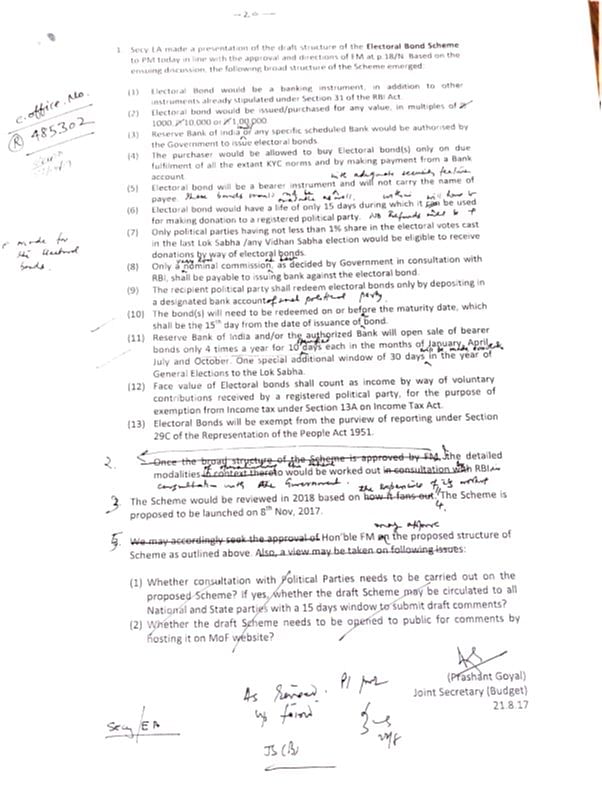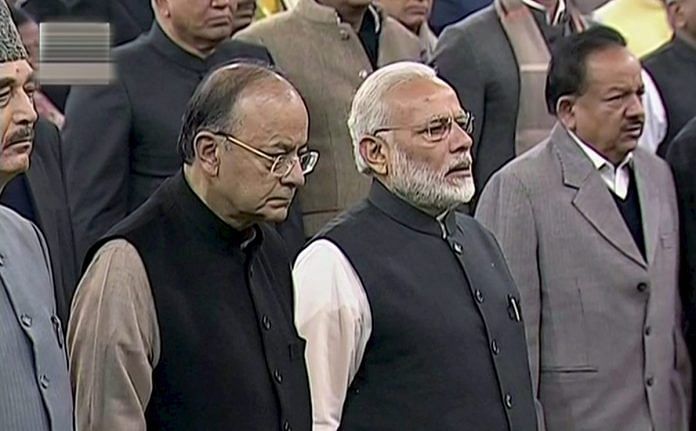New Delhi: The Narendra Modi government was considering opening up the electoral bond scheme for public consultation before introducing it in 2017 — a plan that was eventually dropped the day the prime minister was briefed about the scheme.
According to file notings accessed by RTI activist Anjali Bharadwaj, there were two notes prepared by the finance ministry about briefing the prime minister on the scheme on 21 August 2017.
The first version of the note included a proposal on whether the draft scheme needs to be opened to the public for comments by hosting it on the finance ministry website, but it was subsequently struck down by hand.
Another proposal that was struck down by hand was to circulate the draft scheme among political parties.
The revised version of the note mentioned no consultation either with the public or political parties, and simply stated that the scheme would be launched on 8 November 2017.
Eventually, the scheme was introduced without any public consultations.
What the notes said
The introduction to both the notes said: “Secy LA made a presentation of the draft structure of the Electoral Bonds Scheme to PM today in tune with the approval and directions of FM at page 18/N. Based on the ensuing discussion, the following broad structure of the Scheme emerged.”

The fifth point of the original note said, “We may accordingly seek the approval of Hon’ble FM on the approved structure of Scheme as outlined above.
“Also, a view may be taken on following issues: (1) Whether consultation with Political Parties needs to be carried out on the proposed Scheme? If yes, whether the draft Scheme may be circulated to all National and State parties with a 15 days window to submit draft comments? (2) Whether the draft Scheme needs to be opened to public for comments by hosting it on MoF (Ministry of Finance) website?”
The updated fifth point, in the revised note, simply said, “Hon’ble FM may approve the proposed structure of Scheme as outlined above.”

As reported by ThePrint and The Huffington Post, the RBI had expressed serious reservations about the scheme to the government. The dilution of the authority of the RBI and the risk of the scheme leading to money laundering, forgery and counterfeiting, etc. were some of the concerns raised by the RBI.
While the government did not circulate the draft Scheme with political parties after August, it had invited suggestions from them in May 2017, without sharing the draft with them.
Suggestions of political parties also dismissed
According to documents accessed by Bharadwaj, the Bahujan Samaj Party had even asked the government to share a draft proposal of the scheme — a request which was ultimately not entertained.
“It would be appreciated and helpful if you could furnish some draft proposal of the scheme as is being or has been conceived by the government,” Mayawati, the national president of the BSP had said in her letter addressed to then finance minister Arun Jaitley.
The Congress too echoed this sentiment. “The budget scheme indicated that a scheme will be framed by the government, but we have not been able to locate such a scheme,” Congress treasurer Motilal Vora had said in a letter addressed to Jaitley. “We, therefore, have only the budget speech and some comments you made in April to the media.”
Vora had also said that the scheme would end up divulging the donor and donee details only to the government, and not the people. “I am afraid that this will not ensure transparency in electoral funding; on the contrary, it will be a completely opaque mechanism,” he had written.
The Communist Party of India (Marxist) also voiced some serious concerns regarding the scheme. “We fail to understand how this scheme is transparent,” Sudhakar Reddy, then-general secretary of the CPI, had said in his letter to Jaitley. “It is clear a new scheme is put on the donor’s face to avoid recognition and keep it secretly from the public eye and accountable only to government. This is exactly against the transparency which you announced in the Parliament.”
While BJP ally Shiromani Akali Dal congratulated the party for bringing about “a landmark step towards bringing about transparency in the political funding”, it also flagged a concern.
“It would be more ethical if only profit-making companies are allowed to donate some percentage of their profits to any political party through electoral bonds,” Daljit Singh Cheema, SAD secretary, had said in his letter.
However, the Companies Act had already been amended to remove the provision that capped corporate donations at 7.5 per cent of a company’s profits averaged over three years by the time the electoral bond scheme was launched.
Also read: How finance ministry tried to convince RBI on its concerns over electoral bond misuse



